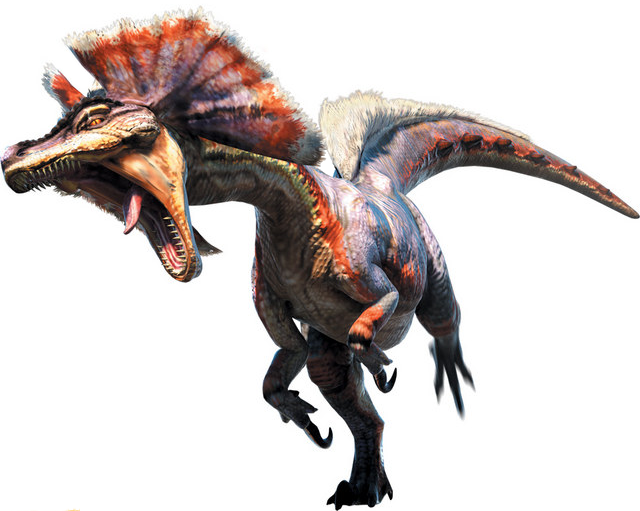Administrator
status: offline
money:
|
Post by The Guild on Mar 30, 2015 20:49:20 GMT

Name: Great Jaggi
Ecology: The Great Jaggi is the head of a Jaggi pack. At a certain age, males leave the pack to live on their own for a period of time before returning to fight for the right to be a leader. They have a very commanding presence. It is said they can call and give complex orders to their pack with their howls and barks. The Great Jaggi nests in gorges and cliffsides decorated in the bones of their prey. The Great Jaggi are in the middle of the food chain. They hunt many animals, some larger than itself. Its prey include Aptonoth, Kelbi, Rhenoplos, Delex, Fish, Giggi, Slagtoth and occasionally young flying and bird wyverns that stray too far away from their nest.
It also may prey on eggs of other animals, along with those of larger predators such as Rathian. Great Jaggi meat has a high nutritional value to larger predators, so it tends to stay away from them, including the likes of Lagiacrus, Gore Magala, Rathalos, Tigrex, Deviljho, and Zinogre as these predators would easily kill it. In fact a Azure Rathalos is shown ambushing a hunter and a Great Jaggi in the middle of combat and pinned the bird wyvern as if it was prey while spitting fire at the hunter. However, should any monster stray too far into Great Jaggi territory, the raptor will try to get rid of the intruder. The Great Jaggi hunts in packs, which helps in the success of its hunt and the previously mentioned hunts of larger wyverns. The average size of a Great Jaggi is approximately 934.3cm. The Jaggi is sexually dimorphic, meaning that the Great Jaggi can only be male. The Raptor can summon its pack by a loud howl. This howl can vary greatly and can give complex orders to its pack such as a strategy to surround their prey.
As the Great Jaggi is much larger than its brethren, it can take on larger prey with relative ease. Its large frill is a sign to show that he is the leader of the pack. It can also serve to scare away potential competitors, as it may make the raptor look bigger than it actually is. The barbs on its powerful tail serve as a formidable weapon when hunting prey, fighting against hunters or as a defense against other monsters. Another powerful weapon is its huge claws, which can easily slice through herbivore flesh. When a Jaggi leaves its pack and finds a new one to lead, it gains the title of Great Jaggi and eventually gets the body of one too. As leader of a large pack of smaller raptors, the Great Jaggi can take on prey bigger than itself, fend off predators without too much difficulty, and cover great distances looking for food. The Great Jaggi fits the role of a leader perfectly, as other Jaggia or Jaggi are loyal to their leader.
The Great Jaggi is highly territorial, and may sometimes attack other monsters that enter its territory. The Great Jaggi, however, has to be wary of challenges from rivals, as if it´s title is usurped, it will be chased away from the pack and will be forced to live alone until it can find a new pack it can gain control of. It is unknown what happens if it can´t find a new pack, but it´s likely that this unfortunate Great Jaggi will have to live alone and the odds of it surviving are very slim.
Low Rank Factors
Bite Strength: 6
Hide Density: 3
Elemental Strength: None
Status Infliction: None
Elemental Weakness: Fire
Abilities
Behavior: A Low Rank Great Jaggi is typically cowardly and will run when it realizes that it can't take on the threat. It is usually slower compared to it's higher ranking versions.
High Rank Factors
Bite Strength: 16
Hide Density: 13
Elemental Strength: None
Status Infliction: None
Elemental Weakness: Fire
Abilities
Behavior: These Great Jaggi are almost never found alone and become enraged before deciding to chicken out.
G Rank Factors
Bite Strength: 36
Hide Density: 33
Elemental Strength: None
Status Infliction: None
Elemental Weakness: Fire
Abilities
Behavior: G Rank Great Jaggi do not cower, will stand for their pack, and will fight until near-death with a hunter. They are a lot faster than lower rankings, therefore confidence is strung high within the spirits of these beasts. They only run when they know that winning is not an option.
|
|








